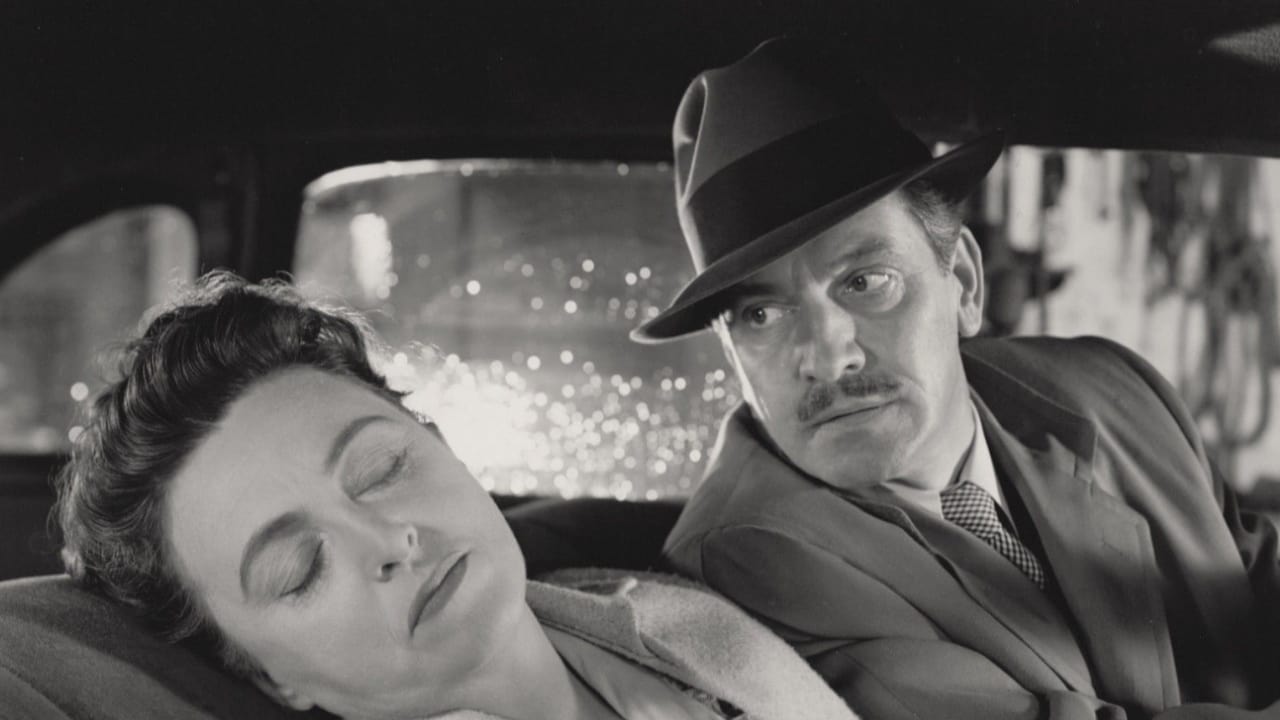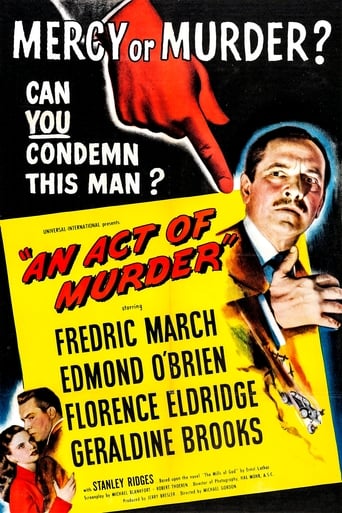

Overrated and overhyped
... View MoreGood idea lost in the noise
... View MoreEasily the biggest piece of Right wing non sense propaganda I ever saw.
... View MoreThe thing I enjoyed most about the film is the fact that it doesn't shy away from being a super-sized-cliche;
... View MoreI watched "An Act of Murder" because I love the actors Frederic March and Edmund O'Brien. Both were Oscar-winning actors who were not exactly handsome (especially as they aged) and managed to give one impressive performance after another over the decades. Sadly, however, despite having two excellent stars, the film lost its momentum towards the end.When the film begins, March plays a tough-as-nails judge and O'Brien a bleeding-heart defense attorney. The two don't like each other all that much--and late in the film, O'Brien's character comes to the judge's defense when he's on trial for a mercy killing. In between is the part of the film I loved most--and which is totally obscured by the ending which is filled with speechifying and some bizarre behavior by March's character. It's a shame, as the idea of mercy killing and medical ethics are really interesting topics and it's pretty amazing to see them talked about in the 1940s, as usually films deliberately avoided this back in the day.
... View MoreThe concept of tempering legality with compassion is a daring, slippery slope. It is today as it was in 1948 when this challenging film was released.Fortunately, this drama has the great acting team Florence Eldridge and Fredric March in the lead roles, lending both power and sensitivity to their characterizations. While conceding that the law must by its nature be clear and committed, one can also empathize with the human challenges faced in the case of a terminally ill loved one who is in great pain and suffering.Where does one draw the line in such cases, especially when a spouse accused of murder emphatically pleads guilty? It's a tough situation created here, and one that must either tread the path of legal justice or find extenuating circumstances to help relieve the inevitable sentence."An Act of Murder" manages to walk this tightrope with considerable balance, thanks to an outstanding cast and some petty talented writers. The film also may be considered a "lost work," despite the pairing of Mr. and Mrs. March in the lead roles.It's also interesting to see only a single bona fide professional review in the IMDb, as though this subject may have been (and still may be) too tough to handle. The most complete review (by Bosley Crowther of the NY Times) expresses the critic's general reaction without declaring a firm stance on the controversial subject of euthanasia. And perhaps this is the best we can ever get, for the topic may be too challenging for us mortals to ever definitively solve.
... View MoreI recorded this film last night on TCM and I am watching it now. I think it is rather well made, with some extraordinary performances, but a few things do not work for me. First, I want to discuss the scene where she experiences wincing pain and breaks the mirror in the bedroom while she is packing. We get this quick dramatic scene and then it is not mentioned again. Of course, the filmmakers are letting us know, by foreshadowing it, how fatal her prognosis is. But how did she explain to her husband the mirror getting broken? And even if she had it fixed without his knowledge, wouldn't she know at that moment that there is something terribly wrong with her? People having good days do not go around smashing bedroom mirrors.Second, and this plot point might seem minor, but why is it that when they pack to go on their trip he takes the note explaining her full medical condition? Obviously, the filmmakers have neatly included it in his suitcase so that she can find it and learn about her situation. But wouldn't he have have left this information in his office or already sent it on to the local physician?And third, now this is what bothers me most, because it is certainly not addressed-- but when he gets behind the wheel during the raging storm with his wife in the passenger seat-- how does he know that his plan to kill her will be successful? What if he kills himself in the process, too? Can we assume that he was not only homicidal but suicidal as well? Yet, did he ever take into account the possibility that he may not survive the wreck but his wife could? If so, what good would that accident have done? Obviously, in the very next scene we see that his plan apparently succeeded and the only visible evidence that he was even in a serious crash is the cane he walks with for the rest of the picture. He has no disabilities or scars (not even a bruise or scratch) while his wife conveniently (and mercifully?) experienced a much more final outcome.Finally, another thing that didn't make sense to me is: when did she figure out he was giving her something stronger than aspirin? And how was she to know how toxic it was? So was her overdose intentional or accidental? This is not really explained, even later at the trial. It seems a bit hard to believe that she would have put the drugs into her purse without him realizing that she had taken them. What seems to be happening at one turn after another in this picture is that the filmmakers are trying to dramatize a philosophical thesis about mercy killing. But because they have fully worked out all the plot details, we are left to wonder if this could have been a better film than it is and if the points could have been made more smoothly and convincingly. As it is we are left with an artistic statement about a difficult decision regarding the quality or end of life, but we are given it in uneven terms and in a scope that is overshadowed by contrivance instead of the social realism they may have been striving to attain.
... View MoreAs Stanley Ridges says in An Act Of Murder what is hopeless today, might be curable on Wednesday such are the advances of medicine. And certainly we can treat and even cure more brain tumors today, even the type that Florence Eldridge has in this film.But in 1948 cancer on the brain was a certain death sentence. At this time young Johnny Gunther was going through the same kind of struggle which his father would chronicle in Death Be Not Proud. Also the public remembered the premature death of George Gershwin from such an illness. Certainly Fredric March's character would also have been aware of these things, most definitely about Gershwin.An Act Of Murder casts March and Eldrige as a small town Pennsylvania judge and his wife with Geraldine Brooks as their daughter. March is a rigid by the book judge known as Old Maximum because of the harsh sentences imposed. March has cross swords with defense attorney Edmond O'Brien in court so he's not real thrilled with Brooks going out with him, but Eldridge supports her daughter.But when after having some dizzy spells, Eldridge goes to see their doctor Stanley Ridges, he finds out that she's got a terminal brain tumor and her suffering will increase exponentially. He's got a real crisis on his hands. Mercy killing is an option he considers and true to his rigid code, March confesses to killing her to relieve her suffering and is put on trial for it. Guess who gets to defend him?Even with the Code parameters strictly enforced at this time, euthanasia was a daring subject to tackle in 1948. The ending which I won't reveal is a cop out, but they could have done little else at the time given the censorship restrictions.March, Eldridge, and the rest of the cast are brilliant. An Act Of Murder raises questions still hotly contested today.
... View More